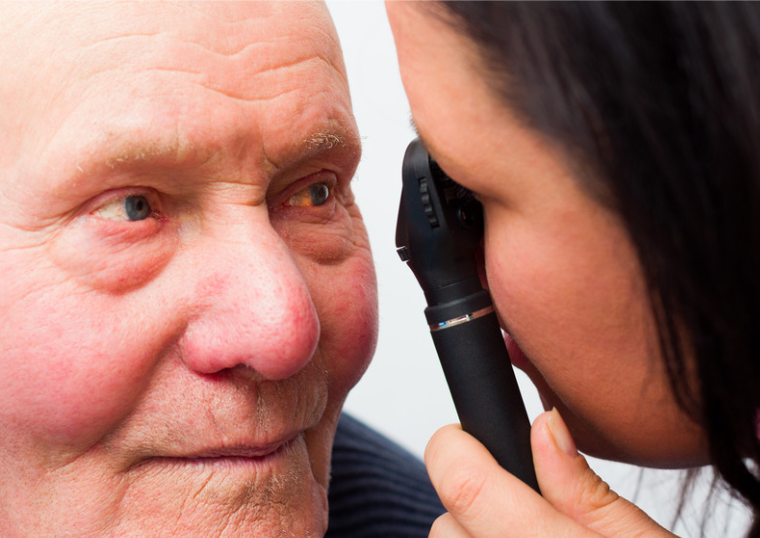
Cataract Awareness Month

(Image above contains an Ophthalmologist preforming an eye exam on a man)
June is Cataract Awareness Month, a time dedicated to raising awareness about the prevalence of cataracts and the importance of early detection and treatment. Cataracts are the leading cause of blindness worldwide, affecting an estimated 17.2 million Americans aged forty and older.
Cataract Awareness Month is an annual event sponsored by Prevent Blindness America, a national nonprofit organization that promotes eye health and prevents vision loss. This event aims to raise awareness about cataracts and encourage individuals to take action to protect their vision. During this month, Prevent Blindness America and other organizations work to educate the public about the signs and symptoms of cataracts and the importance of regular eye exams.
A cataract is a clouding of the lens in the eye that can cause blurred vision, difficulty seeing at night, glare, and other visual disturbances. Cataracts develop slowly and gradually and can affect one or both eyes. Over time, cataracts can progress to the point where they interfere with daily activities such as driving, reading, and watching TV.
Cataracts are most associated with aging and are more common in people over 60. However, they can also develop in younger people due to several factors such as trauma to the eye, diabetes, or long-term use of certain medications. Other risk factors for cataracts include smoking, excessive alcohol consumption, and prolonged exposure to sunlight.
Cataracts develop when proteins in the eye's lens begin to break down and clump together, causing clouding and discoloration of the lens. This clouding can make it difficult for light to pass through the lens, resulting in blurry or distorted vision.
In the early stages of cataract development, symptoms may be mild and not affect vision significantly. As the cataract progresses, however, symptoms may become more pronounced, and vision may become increasingly impaired.
Some of the most common symptoms of cataracts include:
- Blurry or hazy vision
- Increased sensitivity to glare, especially from bright lights or the sun
- Difficulty seeing at night or in low-light conditions
- Colors appearing less vivid or yellowed
- Double vision in one eye
The only effective treatment for cataracts is surgery to remove and replace the cloudy lens with an artificial lens. Cataract surgery is one of the most commonly performed surgeries in the United States, with an estimated 3 million yearly procedures.
Cataract surgery is typically performed on an outpatient basis under local anesthesia. During the surgery, the cloudy lens is removed and replaced with an artificial lens implant, which can restore clear vision. Most people experience significant improvement in their vision following cataract surgery, although it may take several weeks for the eyes to heal fully.
While cataract surgery is highly effective in restoring clear vision, it is essential to take steps to prevent cataracts from developing in the first place. Here are some ways to protect your eyes and reduce your risk of cataracts:
- Protect your eyes from UV radiation: Long-term exposure to sunlight can increase your risk of cataracts. Wear sunglasses with UV protection outside and a wide-brimmed hat to block the sun from your eyes.
- Stop smoking: Smoking has been linked to an increased risk of cataracts. Quitting smoking can help reduce your risk of cataracts and improve your overall health.
- Eat a healthy diet: A diet rich in fruits and vegetables, particularly those high in vitamin C and antioxidants, can help protect your eyes from cataracts.
- Manage chronic conditions: If you have diabetes or other chronic diseases, responsibly managing them is essential to reduce your risk of developing cataracts.
- Get regular eye exams: Regular eye exams can help detect cataracts in their early stages when they are easier to treat. They can also detect other eye conditions that could potentially lead to vision loss.
- Avoid prolonged use of steroids: Long-term use, particularly in high doses, has been linked to an increased risk of cataracts. Discuss the potential risks with your healthcare provider if you need to take steroids.
- Manage your alcohol intake: Excessive alcohol consumption has been associated with an increased risk of cataracts. Limit your alcohol intake to reduce your risk.
In conclusion, cataracts are a common vision problem that can significantly impact a person's quality of life. While cataract surgery is an effective treatment option, taking steps to reduce your risk of developing cataracts is essential. Protecting your eyes from UV radiation, eating a healthy diet, getting regular eye exams, and managing chronic conditions can all help reduce your risk of developing cataracts. In addition, by taking proactive steps to protect your vision, you can help ensure that your eyes remain healthy and functional throughout your life.
At Patriot Vision Industries, we believe that everyone deserves access to high-quality eye care and the ability to see clearly. That's why we fully support initiatives like Cataract Awareness Month, which helps to raise awareness about cataracts and the importance of regular eye exams. We understand the impact that vision problems like cataracts can have on a person's quality of life, and we strive to make a difference by providing high-quality adaptive technology to those who need it most. Whether you're dealing with cataracts, nearsightedness, or other vision issues, we're here to help you find the solutions you need to live your best life. Contact us today at 1-800-364-1608.
